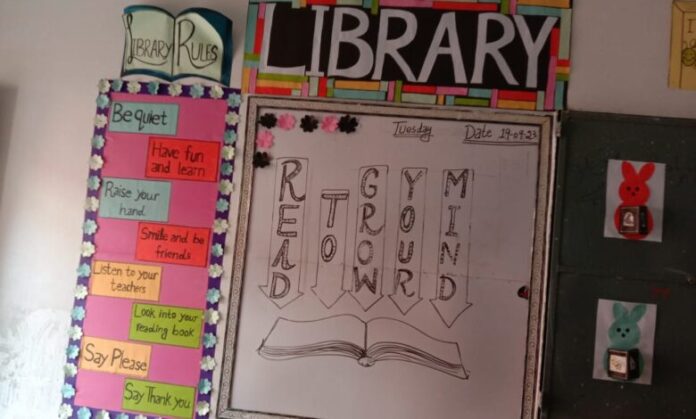
Anees Takkar
Until the fifth grade, students are limited to using only course books, with non-curricular books generally excluded from the curriculum. There is typically no effort to instill a reading habit in children during this period. Many teachers focus on trying to engage students in academics, as children tend to find more joy in sports rather than books.
However, in an effort to promote a culture of reading among children, a multi-volume library has been established at Government Girls Primary School in Kot Baba Tangi, Charsadda. This library contains a variety of basic books.
The primary objective of this library is to encourage children to read their favorite books during their free time or take them home for further reading. The library initiative has been implemented by Komal Bilawal, the school leader assigned to Tangi, who is responsible for overseeing ten schools in the region.
On September 19, 2023, Komal Bilawal officially inaugurated the library at Government Girls Primary School Kot Baba Tangi with the support of the Charsadda Education Department. Komal expressed that a vacant room in the school had remained unused for an extended period, and she was eager to transform it into a functional space.
Emphasizing the importance of capturing children’s interest, she mentioned that the room was adorned with various colors and designs. The choice of vibrant colors and designs was deliberate, as children are attracted to colorful environments. Throughout this process, the teachers at the school provided significant support.
Faiza Gul, a seasoned education professional with extensive experience, highlighted the significance of having a library at the primary level. She explained that in schools, children are often restricted to reading specific books, stifling their natural abilities. Therefore, having a library at the primary level becomes crucial, allowing students to choose books of their preference and study them thoroughly.
Also Read: Tragic Events Unfold: Innocent Lives Lost in Tank Ambush and Polio Worker’s Murder
Gul suggests that establishing a library not only enables teachers to understand their students’ interests but also allows them to tailor the children’s education to enhance their natural abilities. Addressing children’s psychology, Gul notes that kids are generally drawn to colorful books, advocating for the inclusion of 3D or 4D printed books in libraries to captivate children’s interest.
She emphasizes that these books should cover topics such as science, religious tolerance, history, environment, ethics, and practical everyday tasks, extending beyond the standard curriculum. In response to the demands of the modern age, the library should also teach children how to research topics on the computer, promoting educational use rather than mere entertainment.
Komal Bilawal observes that children nowadays are increasingly reliant on computers and mobile phones, leading to a decline in their inclination towards studying. Recognizing this trend, the school has allocated specific times for library activities. During these designated times, students from a class visit the library under the supervision of a teacher, allowing them to choose books according to their preferences and engage in reading. To assist students in overcoming any challenges, a female teacher is available to provide support.
In the initial setup of the library, storybooks, drawing activity books, and general knowledge books were included. Additionally, flashcards for English, Urdu, and Pashto alphabets were provided to aid children in understanding letters and forming words easily. Komal mentioned that she acquired these books and training materials from USAID two years ago, dedicating them to the library. She expressed gratitude to all the teachers at the school who contributed to covering the costs of building the library.
Currently, the existing collection of books in the library is insufficient, and efforts have been made to contact various individuals and institutions to address this shortage. However, there has been no adequate response so far. Komal’s vision is to establish similar libraries in all schools, and she appeals to individuals and institutions to donate books to the library, enabling more children to have access to reading materials.
Annabiya, a fifth-grade student, shared her positive experience with the library, stating that teachers are very helpful in explaining and selecting books when students go to borrow them. She expressed her enthusiasm for the diverse range of books available in the library, including Islamic books, history books, cartoon storybooks, and more, adding that every visit to the library makes her reluctant to leave.
Media reports highlight the efforts of the non-governmental organization ‘Alif Laila Book Bus Society’ in collaboration with USAID in establishing 100 libraries in primary schools of District DI Khan and District Bannu during the 2013-14 period. This initiative included 50 libraries specifically for girls’ primary schools, each housing up to 850 different types of books. Special training was provided to 250 teachers to ensure the orderly management of these libraries, aiming for their sustainability even after the project’s conclusion.







